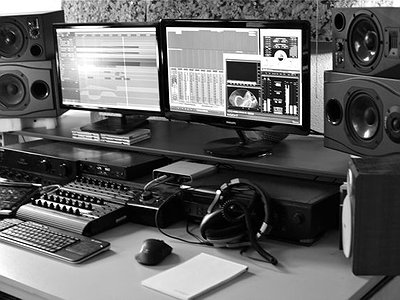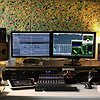What, to you, are the main goals of recording, editing and mastering? Do you, for example. feel it important that a recording is a reflection of reality or is it by default artifice and therefore subject to its own rules?
Every step in the process of getting a track to the listener requires specific skills. Of course first there's the song writing, then the skills of playing the instrument, then we enter the recording studio. Recording instruments can be done quick and dirty but doing it properly, that is getting the full sound out of the instrument and capturing it, is quite difficult and time consuming. Once everything is properly recorded, the mixing and production process starts. This again asks for different skills and experience. A mixing engineer and producer needs to visualize an image of the sound. Drums left? Right? Centre? Back? Front? And what about that backing vocal? There are thousands of choices to be made that can bring forth an exceptional record or just a plain one. The mastering engineer is a kind of quality assurance officer.
A recording is a recording and a live event is a live event. Let’s not fool ourselves. The Led Zeppelin live show on DVD is supposed to give a live feel but they spent many days editing those recordings. The result is something that seems very live but of course it’s not. The mind set of someone listening at home is different from someone in the audience during a live concert.
Recording can be related to a particular location, but thanks to technology, it no longer has to be. How do you see the relation between sound, location and space?
Indeed recording can take place anywhere. The studio is no longer, as it really was until the mid '70s, a scientific laboratory and portable recording and production gear enables the artist to record wherever and whenever he likes.
Of course the context of recording makes a difference. Portable gear is often not as sophisticated as studio gear. The level of how important this is depends very much on the intention of the artist. When he wants a perfect sound and a perfect production he’d better choose the studio. If he wants to capture the atmosphere, the general environment of the place where the recording takes place then portability, direct-ness, etc. are much more important. Sonic imperfections enhance that what the artist wants to communicate.
When it comes to mastering it is important that I know the perspective of the artist. Mastering should definitely take place in a studio.
In how far are the objective, universal and measurable parameters for what constitutes quality in a recording? What are currently your main challenges and ambitions in terms of your approach to mastering to further these quality standards?
They are measurable, partly objective but certainly not universal. My main challenge is to get the right balance between understanding as much as possible what the artist wants to achieve and getting that out of the music within a time frame that is economically acceptable. I can measure up what I hear and I can have an opinion about its quality from a technological point of view but whether that’s a good thing or a bad thing depends on what the artist has in mind. I have had recordings that sounded shoddy but up to a degree that was what the artist wanted.
In other cases, though, I can see that mistakes have been made in the mix. For instance the use of a compressor can and in many cases does, crush the living daylights out of any sound.
Tell us about your studio, please. What were criteria when setting it up and how does this environment influence the creative process? How important, relatively speaking. are factors like mood, ergonomics, haptics and technology for you?
I work in a completely digital setup which is still looked down upon in the mastering scene. „Real“ pro’s don’t work „in the box“. They have outboard gear. It costs tons of money and that investment alone guarantees that they’re adamant about debunking the much less expensive digital material that has come to the market in recent years. My choice for digital has been a conscious one, both economically and creatively. Over the past few years I have tried and tested various professional mixing and mastering software. There’s a lot of free and cheap software available but I found that professional software yields better results, better than analogue material, and has a more efficient workflow.
My working process is not very fast. I try not to work like I’m in a production chain where I sit and work one track after the other. That’s not how I would like to see my music treated if I were the artist. My relation to the artist is one of mutual respect. I know he invested a lot of time and effort in getting to this point and I have my skills to make it from good to awesome. That requires time and attention.
I work for two hours and then take a break. Sometimes the break means working on quite different material, sometimes it’s filling the dish washer. I have set up my workflow inside the DAW to be able to work as fast as possible, though. Reaper is extremely customizable in that respect.
What do you usually start with when working on mastering a new piece?
Listening. Break. Listening again. Asking questions. Listening again. Going back and forth. Going from big picture to transient level and back. Then I decide how to proceed, and basically a lot of these steps are repeated over and over.
When I receive music for mastering we discuss what the artist tries to exude through his music. Most of my customers are not pop or rock musicians. They have very particular ideas about what they want sonically. But some are not very skilled recording engineers. I have received tracks which, while creatively brilliant, were mixed to mono, or were severely out of phase.
Certain sounds seem to be inextricably connected to particular genres or styles of music or even to different formats, like the CD or vinyl. Do you consider these as limitations, as a given or as a compositional tool which can be used in an inventive way?
They can be all of the above, depending on your state of mind.
The line between production work and composition is blurring. In how much do you feel that these two areas could mutually influence and inspire each other?
They do and they should.





